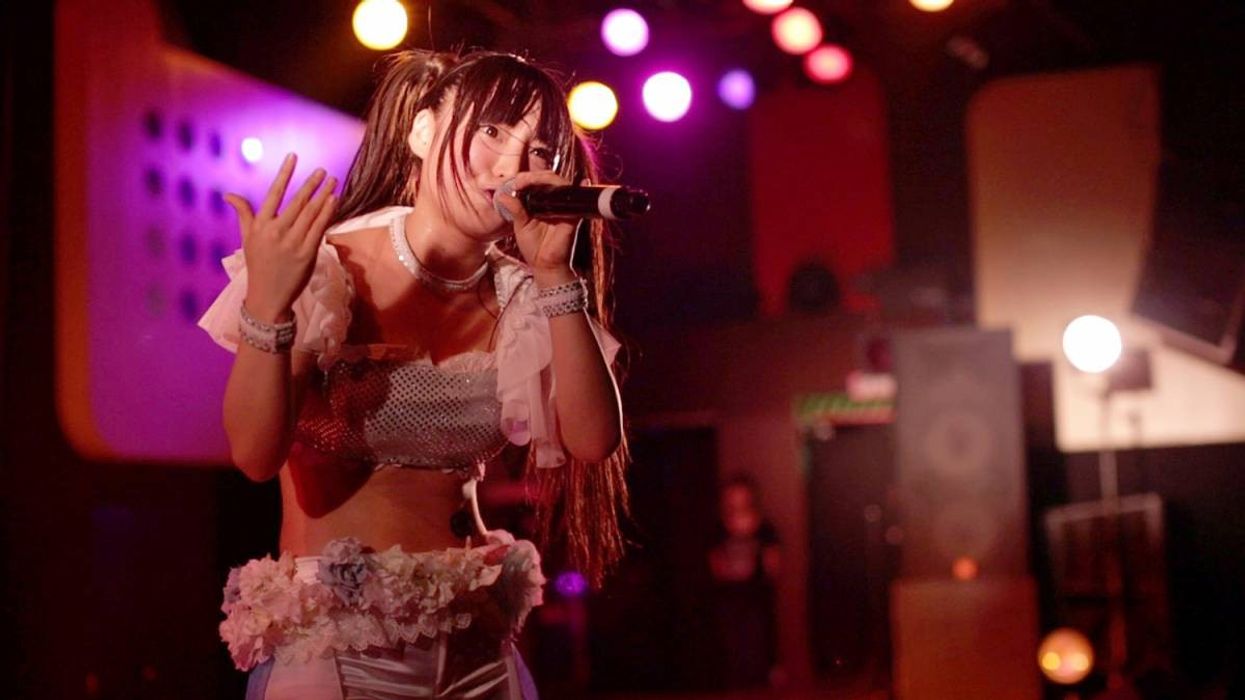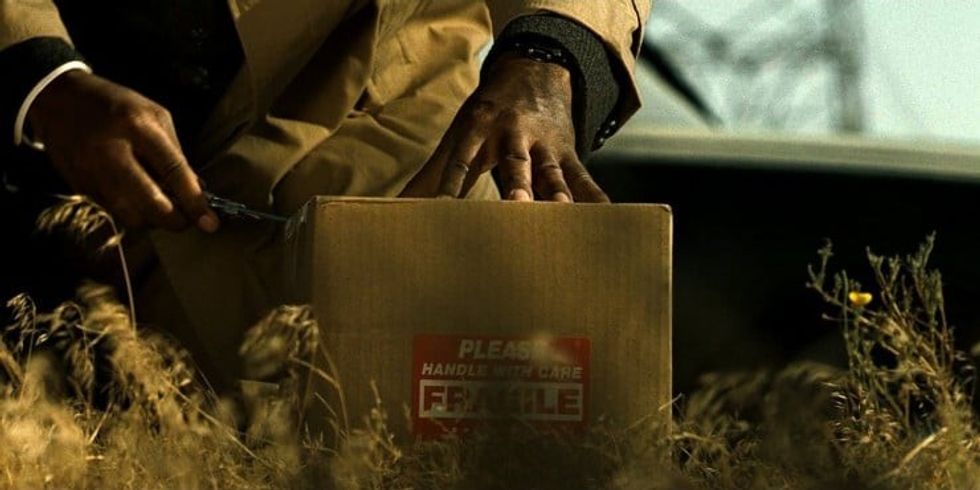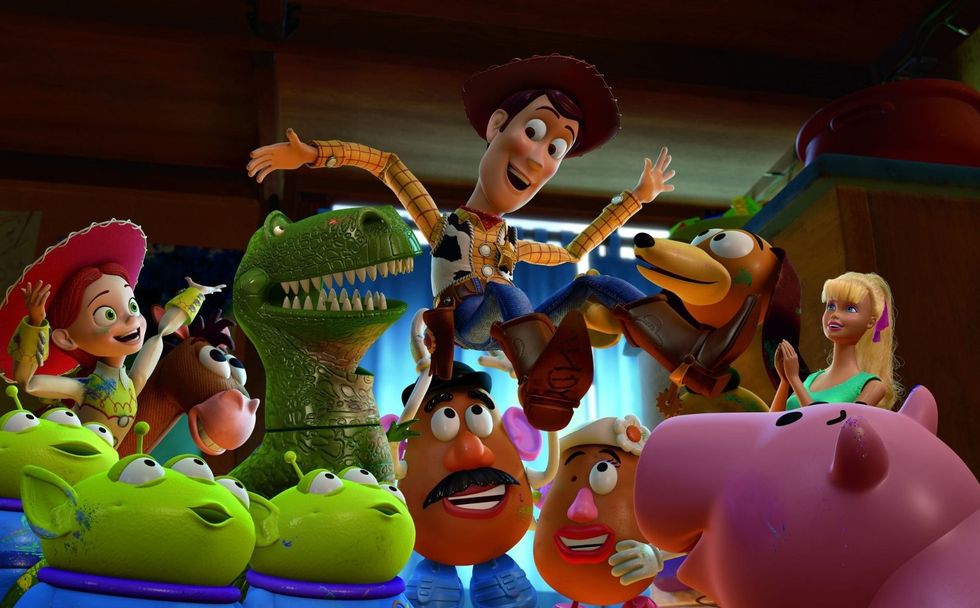Shooting Uncomfortable Realities: Kyoko Miyake on One of the Year’s Most Disturbing Docs
Sundance and HotDocs pick ‘Tokyo Idols’ pushes audience comfort levels to raise questions about modern life.

You might expect that highly energetic, teenaged Japanese pop stars in tiny, brightly-colored outfits would engender adoring, screaming fans who dance in choreographed unison at their concerts and rabidly follow them on social media. What might surprise you is that these fans are not fellow tween girls. They are adult men.
In a Japanese national phenomenon, female performers known as “idols”—sometimes as young as eight—actively cultivate obsessive fan bases of grown men, whose participation has made this once-fringe hobby into a billion-dollar business.
Filmmaker Kyoko Miyake, originally from Japan herself, explores this phenomenon in her layered documentary Tokyo Idols. The film primarily focuses on Rio, an up-and-coming idol and self-made entrepreneur who is as devoted to her fans as they are to her, communicating with them almost constantly over the internet and planning her life around performances and “meet and greets” where fans pay to spend carefully controlled moments in her presence. We also spend time with several of these fans and witness how they let all other responsibilities erode in the face of their fandom, some even going into debt over purchases of their chosen idols' signatures and paraphernalia.
“Every time you went back you had this fresh sense of creepiness.”
The film goes out of its way to offer a non-judgemental portrait of everyone involved, but the topics at hand push Western levels of comfort around sexuality, relationships, and what it means to be connected to other humans in an increasingly digital world. At once, were are sympathetic with, concerned for, and repulsed by the choices made by the film’s subjects.
No Film School spoke with Miyake and her producer (and husband) Felix Matschke after the film’s premiere at Sundance 2017. Last week, it played at Toronto’s prestigious HotDocs Festival, where Miyake also served on the documentary jury. Our conversation delves into how they handled their own uneasiness with some of the film’s material, why you may have to occasionally leave the situation you’re filming to keep perspective, and more.
No Film School: I must admit, I was squirming in my seat during the screening. How did you decide where to draw the line in terms of audience comfort?
Kyoko Miyake: That's a very good question because I found the topic uncomfortable at the beginning, but very quickly that discomfort went away. You know, you step into that world and almost within 20 minutes of the first concert, things start to feel normal. So we were going back and forth between feeling normal and comfortable and finding it creepy and uncomfortable.
I think it helped that I don’t live there anymore and my crew was mostly non-Japanese. Between shoots, we were based in Britain and our crew was based in Canada, so every time you went back, you had this fresh sense of creepiness. We didn't want to forget that; this film was not meant to be an apologist film for these guys. We wanted to sympathize with them and humanize with them, but we are not condoning their behavior.
Matschke: Yeah, we didn't want to vilify people because it’s a mainstream phenomenon. These guys are somehow normal guys.They're living normal lives, they're trying to get by, they're kind of indefinitely lonely. And that's kind of where this desire to connect comes from. As Kyoko described, it was a hot and cold bath between discomfort—on one hand, these are creeps peering at scantily-clad young girls, but also they’re guys who were just trying to meet up with friends and have nowhere else to go.
“I was conflicted throughout the shooting.”
NFS: I imagine that each of your relationships to the subject matter was different. Felix, if you were Japanese, you could invariably be one of those “creepy” guys.
Matschke: Yeah, they were all my age and up, so that did feel very wrong. The fact of the matter is that how it's organized, how people behave, and how people stick to keeping their distance to the girls kind of gives you a sense of comfort.
Miyake: And also, we wanted to celebrate the resilience of girls like Rio. Because that's the world that she is in. She might be stuck in it, so we wanted to embrace her. She exercises an enormous amount of power over these men and we wanted to look at that power game. But at the same time, we wanted to look at the foundation, the broader context and the ideas that support this culture, which is deeply misogynistic and sexist. Striking that fine balance was probably one of the trickiest parts.
NFS: One thing I loved about the film is that it's compassionate. It doesn't feel judgemental. I'm sure a lot of that came in post-production, but on the ground, you had to film both the men and the girls who are doing things that would be considered unusual [here in the States]. How did you stay non-judgemental in person?
Miyake: I was conflicted throughout the shooting. For me, it was easier to feel compassion and sympathy for the girls because I was once a girl in Japan. So I know how it feels like to grow up as a girl and to learn that to achieve anything in that society you do have to conform to [gender norms].
It was harder for me to sympathize with the men, and I went in with all sorts of preconceptions. These are the guys who can't deal with women of my age, so I was probably prejudiced, and it took me quite some time to feel like I was beginning to understand them and where their anxiety comes from. But at the same time, I couldn't agree with everything they seem to think about women or relationships.
Also, with the mothers of those idol girls who are my age.... When you start to feel like something is fading away and you see those young girls who are enjoying the prime of their sexual power.... I felt quite conflicted about what the mothers are doing to their daughters. But at the same time, I know that their idol culture is just a microcosm of a wider Japanese society, which is very sexist. They are all living that reality every day and I am not. So, who am I to judge them?

NFS: If you were interviewing someone and you did feel a sense of judgment or prejudice, did you have tactics for not showing your feelings, or did you let them know how you felt?
Miyake: Usually I did not show [my feelings] because growing up as a girl in Japan, you learn how to hide your emotions. I was a very angry teenager and very angry woman. I learned that to show [emotions] means instantly alienating the whole room. So I'm quite good at listening even though I'm completely disagreeing with everything somebody is saying. But whenever we are talking about the intentions of the film, I think we try to be quite honest and truthful.
NFS: The audiences at Sundance were your first, and they are primarily Western. Did their reactions surprise you? What kind of feedback have you gotten so far?
Miyake: I was surprised that there were really thoughtful questions at the screenings so far. I was expecting more like, "Oh, these guys are so creepy, shouldn't they be locked up?" You know, because I lived in Britain for 15 years, where this topic is so extremely touchy.
“I'm quite good at listening even though I'm completely disagreeing with everything somebody is saying.”
NFS: In terms of older men and younger girls?
Miyake: Yeah, there have been a series of scandals. And some people don't want to look beyond the initial reaction. They think, "Oh, this is just criminal," or, "This is just wrong."
But the audiences [at Sundance] were surprisingly open-minded and curious and non-judgmental. I don't know—maybe [people who were uncomfortable] didn't talk or ask questions. But the ones who spoke were open. And what made me really happy was that after the screenings, some female students and young women came to speak to me. So that was really encouraging. They were not necessarily interested in Japan; they were just curious in general. Because we didn't make the film only for those who are already interested in Japan or Manga culture.
Matschke: One of the things that we discussed initially is who to make the movie for. And we chose to make it for uninitiated audiences, not Japanophiles. It would be very different to make a film targeted to a Japanese audience that is very aware of the phenomenon versus the rest of the world that might not be.
Miyake: We didn't want to have one strong conclusion or message and ask people to take actions tomorrow. We made this film so that maybe a discussion would start and people would start looking around themselves, if they are living in this country or in Europe. Maybe they see some parallels.

NFS: Even if you don’t have an explicit message, the film talks a lot about what connectedness means today, and as media-makers we have some role in that conversation at a time when some people are consuming media more than they're talking to each other. What do you think our responsibility is as documentary filmmakers?
Miyake: I don't have an immediate answer to that question. It's a big question. But I thought it was interesting that the girls and their fans are connected 24/7. They share all sorts of things, like what they've eaten or what they saw or who they met. But the more they share online, the more desperate they are to meet each other in person.
Until 10 years ago, all the successful singers were supported by the broadcasters and big management, and now they can skip that and they can do live-streaming, and they can tweet, and they can put all sorts of stuff on YouTube. They can do all these small concerts. They can just skip the whole middle man and perform directly to audiences in small live concert venues and they can stream online. There have been some idol bands that have been represented by some of the most powerful broadcasters that weren't really successful because the way people would find the freshest, newest, most exciting stuff has changed. And the big media structure hasn't really caught up with that change.
“When we had to get people to sign release forms, they were wondering whether they had to use their real names or their online names.”
NFS: I grew up in the punk scene, and even though the idols’ music couldn't be more different, I felt some correlation there. Like the way the men are in the audience—they're so active and loud, and there's this DIY, grassroots community thing happening.
Miyake: Yeah. Our editor, who is British, was from the punk scene in London and she saw parallels, so that was really interesting.
Matschke: As far as how connected people are and media and technology, the most interesting thing I found during the shoot was that when we had to get people to sign release forms, they were wondering whether they had to use their real names or their online names. And the question for them was, if they used their real names, they would reveal their real names to each other. So they were meeting every day and connected electronically every single minute for 24 hours, but actually anonymous. It's this deep connectedness, but at the same time loneliness. I didn't know that existed.
Miyake: Yeah, they used their alter-egos. So between 9 and 5, they have this Japanese Salary Man face. They have to do what their boss tells them to do. But after 5, they come to Rio's concert they can put on a different persona. You go to these concerts and you'd wear name badges, just like you do at a conference, but these are online names.
NFS: You just blew my mind. So nuts and bolts, what did you shoot with and what did you like or dislike about it?
Miyake: We shot mainly on FS7.
Matschke: During development, we went there with a low budget, so we shot on DSLRs, 5D MKIII, and were riding buses, lugging as little as possible around. Then we shot a bunch on a C300, which is very comfortable; it’s still quite a small camera. And then a lot of it also on FS7 when Van Royko came in as a proper cinematographer.

Miyake: Felix and Van were also big Caucasian cameraman looking completely out of place. So sometimes we could shoot stuff that Japanese cameramen wouldn't be able to shoot.
NFS: In what way?
Miyake: Because they look like foreigners and people would kind of allow them to shoot. And sometimes people started to completely forget that Felix was there because he doesn't understand Japanese, so they felt more comfortable talking naturally between each other.
Matschke: A true fly on the wall—the fly doesn't understand you, actually.
NFS: How did you two get together from two different countries to work on this film?
Miyake: We are actually married, so we were both based in London and we are now based in New York.
NFS: Oh! So now I have to ask: do you have any tips about how to make professional collaboration with a romantic partner work well?
Miyake: Maybe the reason we didn't tell you immediately was that some people, when we pitched this idea, loved the project and the idea, but they really didn't like the fact that we are married. I think what was helpful was that there was somebody else in this core team, so it wasn't just us and the rest of the team.
Matschke: Yeah, but since we talk to each other all the time, it might be difficult for other parts of the team to feel included, and so that’s maybe one part that makes it harder to work with a bigger team. But I think one thing that probably makes it work is that I don't want to direct or edit. I find it fascinating, and beautiful things come out of it, but I don't want to do that job. And Kyoko doesn't want to do the things that I do. And so I think the fact that we don't want to do each other's job helps.
Miyake: And also we tried to pay attention to what other members of the team might be feeling. I've seen sometimes where it was always the couple versus somebody else in the team, and it doesn't help anybody to be in that situation. So we try to pay attention and try not to look like a unified front.
NFS: I think that's good advice for any director-producer team, married or not!















